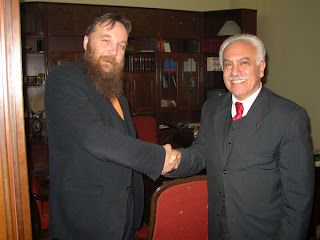A new article covers Dugin's Turkish contacts, with Doğu Perinçek and his İşçi Partisi (IP, Workers' Party). The article is by Martin Riexinger, "'Turkey, Completely Independent!' Contemporary Turkish left-wing Nationalism (ulusal sol/ulusalcilik): its Predecessors, Objectives and Enemies," Oriente Moderno 90, no. 2, pp. 353-95.
Riexinger explains that IP is one of two major organizations on the Turkish nationalist left. It generally receives few votes in elections, but its importance comes not from its electoral activities, but from the fact that it--like Türk Solu, the other major left nationalist group--draws its support from "members of the army, the bureaucracy, the academe and the professions." Thus for the Eurasia Conference it organized in 2004 it attracted the support of Süleyman Demirel and the presence of diplomats from the Turkic republics, China and Iran, as well as of the former head of the National Security Council, General Tuncer Kılınç.
The IP was established out of the Sosyalist Parti in 1992 by Perinçek, formerly the leader of the Türkiye İhtilalcı İşçi ve Köylü Partisi (Revolutionary Workers' and Farmers' Party of Turkey), and before that a Maoist student leader. The IP's leftism now consists primarily in the use of some Marxist terminology and a "keen interest in workers' and farmers' protests" (despite its middle-class membership), and its nationalism consists primarily in its stance against the threats that the US-dominated New World Order allegedly pose to Turkish independence, and thus also in opposition to the EU. In this Perinçek needs allies, and this is the basis of his relationship with Dugin, whose stand against the US and globalization Perinçek shares and supports.
The IP is generally anti-religious, seeing religion as reactionary, and drawing on European post-Feuerbachian criticism of religions. It thus has no interest in Dugin's Traditionalism, which in Turkey is associated with the Nakşibendis and the Nurcus, the latter of whom are among the religious groups that the IP attacks. It also attacks the Islamists, Christian missionaries, and the Gülen movement, which emphasizes dialog with non-Muslims. Given the rapprochement between nationalist right and nationalist left that has already taken place, however, Riexinger considers that a future rapprochement between the nationalist left and some Islamists is not impossible, given that they both share the same enemies--the EU, the USA, missionaries, Jews, Freemasons, and homosexuals--and "subordinate the individual to the collective and ... cannot imagine something more horrible than a culturally heterogenous Turkey."
An interesting detail: Russian nationalists have generally been supporters of their fellow-Orthodox Greeks. Dugin, however, has supported Turkey rather than Greece in Cyprus, which has the important consequence of making him acceptable to Turkish nationalists, on the grounds that the Greeks are a maritime (and so an Atlantic) civilization rather than a Eurasian one.


No comments:
Post a Comment